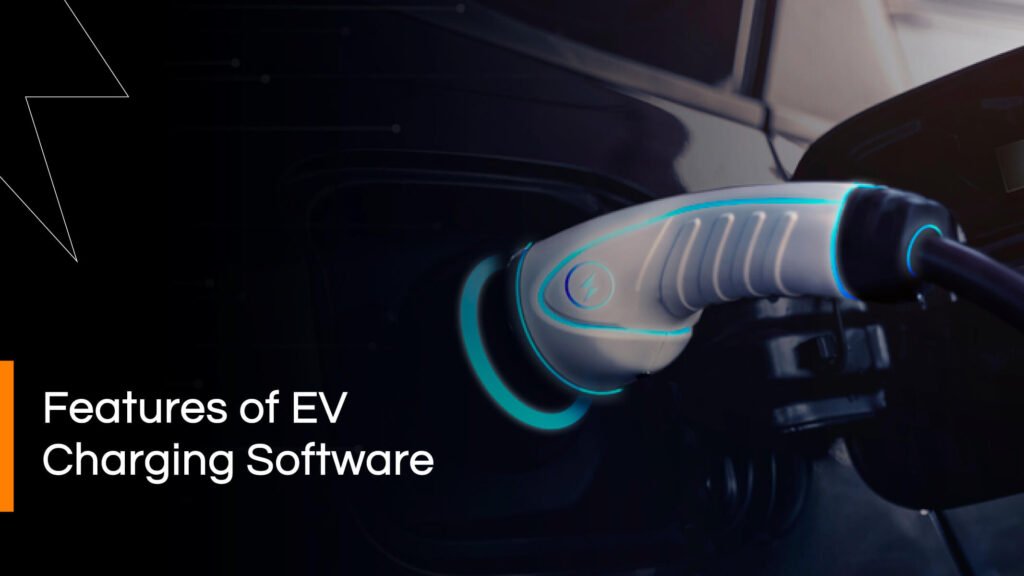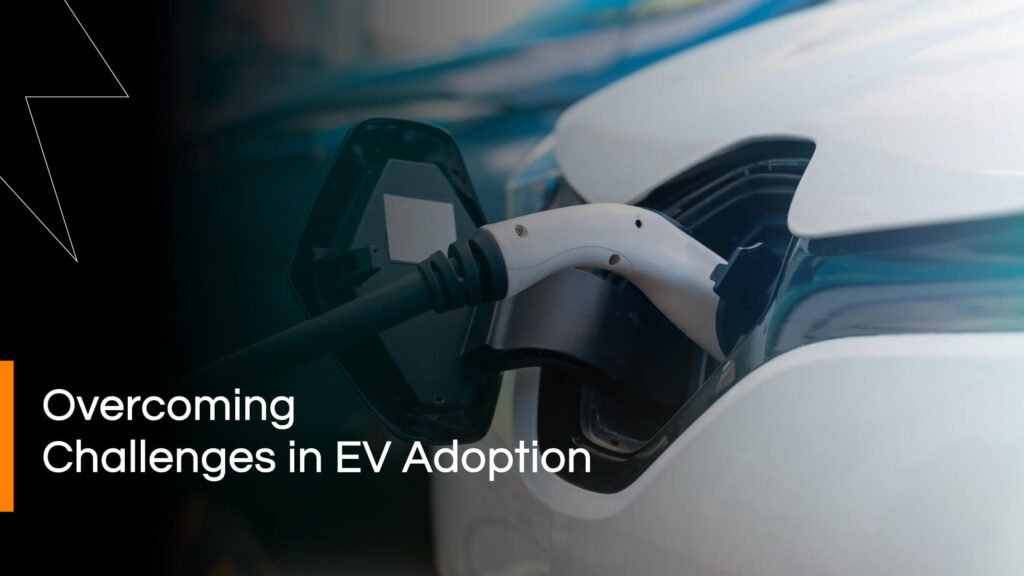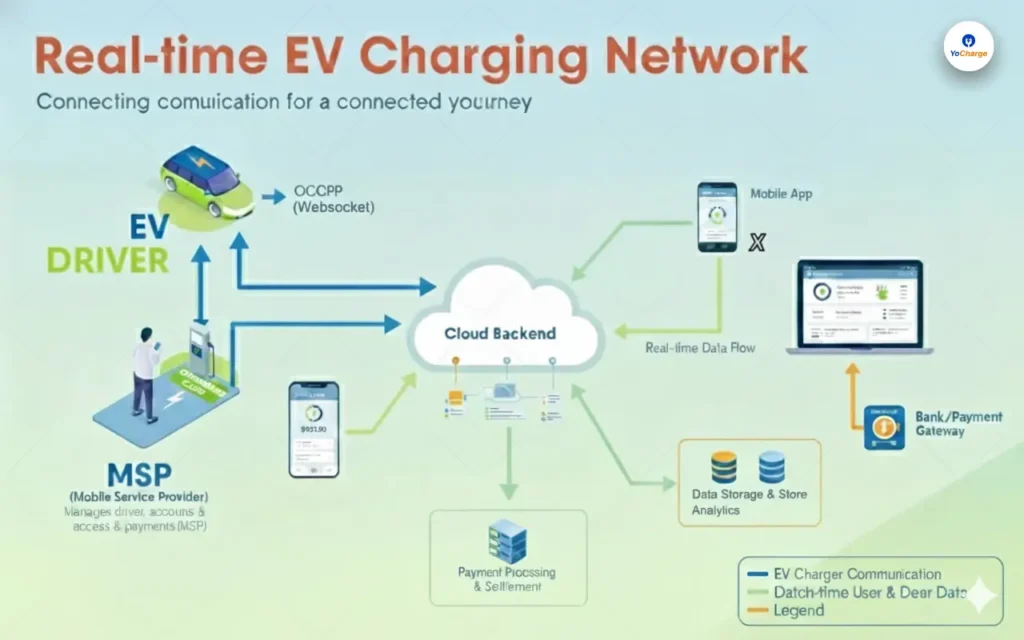
The sudden boom in the EV industry has opened a window of new business opportunities in the form of EV Charging Management Software (EVCMS). According to a recent report by Report Linker published on globenewswire.com, the EV charging management software market is expected to reach $25,922.4 million by 2031 from $980.0 million in 2021, boosting at a CAGR of 36.7% during the forecast period 2022-2031.
An EV Charging Management Software is a software platform or system that manages, controls, and optimizes electric vehicles’ charging process. It improves EV performance, streamlines charging functions, and enables features that enhance the overall user experience.
Features of EV Charging Software:
EVCMS platform offers a range of features and functionalities that simplify and enhance the charging process. Following are some of the features:

1. Locate the Nearest Charging Station:
One of the most convenient features of EV charging management software is its ability to provide locations of charging stations. By optimizing real-time data, the software can pinpoint the nearest available charging stations and save valuable time for EV owners.
2. Smart Charging:
Additionally, this software enables smart charging scheduling, allowing users to set specific times for charging. This feature takes advantage of off-peak electricity rates, minimizing charging costs while ensuring a fully charged battery when needed. The software also facilitates remote monitoring and control, enabling users to check the charging status, receive notifications, and even start or stop the charging process from their mobile devices. This remote accessibility adds flexibility and convenience to the charging experience.
3. Seamless Payment Integration:
Another aspect that contributes to the convenience of EV charging software is its seamless payment integration. EV charging software incorporates various payment methods, such as mobile wallets, credit cards, and other digital payment gateways, into a unified platform. This eliminates the need for multiple accounts or physical payment options, simplifying the payment process for users.
4. Data Analytics:
The charging software gathers and analyzes data on charging patterns, energy consumption, and user behavior. These insights provide valuable information that can be utilizable to optimize charging infrastructure planning, improve energy management, and enhance the overall user experience. By leveraging data analytics, EV charging software can offer personalized recommendations, predictive maintenance alerts, and tailored charging options based on individual usage patterns.
Challenges & Solutions in EV Adoption:
EV charging software plays a vital role in overcoming the challenges that hinder the widespread adoption of electric vehicles.

1. Range Anxiety:
One such challenge is range anxiety, which arises from concerns about the cost, battery life, and the scarcity of charging stations. EV charging software addresses these concerns by providing accurate information on charging station locations and availability, offering peace of mind to EV owners.
2. Lack of Charging Infrastructure
As the number of EVs on the road increases, the demand for charging stations surpasses the current supply. However, EV charging software helps bridge this gap by optimizing the utilization of existing charging infrastructure. Users can plan their routes accordingly by providing real-time updates on charging station availability, minimizing the risk of encountering fully occupied charging stations.
3. Connector Compatibility:
Different EV models often require other charging connectors or standards, making it challenging for EV owners to find compatible charging stations. However, charging software can provide information on charging station compatibility, allowing users to locate stations that are compatible with their specific EV model.
4. Maximizing Vehicle Performance and Battery Efficiency:
EV charging software goes beyond convenience; it also plays a vital role in optimizing vehicle performance and battery efficiency. The software manages and controls various components, such as battery management systems, motor controllers, and power electronics, to ensure efficient operation and maximize driving range.
Battery management and monitoring are essential aspects of EV charging software. It tracks battery health, optimizes charging and discharging processes, and provides insights into battery performance. By effectively managing the battery, EV charging software enhances reliability, prolongs battery lifespan, and ensures optimal performance.
EVCMS offers range estimation and navigation features. The software provides accurate range estimates by considering factors like battery charge level, driving conditions, and route planning. This empowers EV owners to make informed decisions, ensuring they reach their destinations without running out of battery power.
5. Integration with Charging Infrastructure and Energy Management:

EV charging software seamlessly integrates with charging infrastructure, providing users with a convenient and intuitive interface to locate, navigate, and initiate charging at available stations. The software allows for monitoring of charging progress, remote charging initiation, and compatibility checks through mobile apps or connected platforms. It also offers smart charging and energy management features, enabling users to schedule charging during off-peak hours for cost savings and contributing to grid stability through load balancing and grid interaction. The data analytics and insights derived from the software provide valuable information on driving patterns, battery usage, and charging behavior, benefiting manufacturers, fleet operators, and utilities in improving EV design, planning charging infrastructure, and offering tailored services to users.
Benefits of EVCMS:
The primary intent of an EV charging management system is to streamline the charging process to reduce the usage of batteries, maximize output and save money. Following are some of the features listed in detail:
1. Increased Efficiency and Cost Savings
The electric vehicle charging software boosts efficiency and saves costs for businesses by administering the EV charging process. This management of the process reduces the risk of power imbalances and minimally optimizes energy consumption. Thus, leading to saving costs.
Improved System Reliability:
EV charging management systems can help to improve the reliability of charging stations by providing real-time monitoring and by enabling remote troubleshooting. This can reduce downtime and ensure that charging stations are always available when needed.
Remote Monitoring and Control:
Charge point operators can remotely access the charging stations located in different areas through the central management system. This allows the EV charging businesses to track the status of chargers, charging stations, charging sessions, payment transactions, and troubles, if any.
Enhanced User Experience:
The user experience of electric vehicle charging software is enhanced by providing a simple and intuitive interface. This makes it convenient for EV users to locate and use charging stations. Other benefits include multiple payment options, tracking charging sessions through a mobile app, or directly paying and charging EVs using a unique QR code.
Improved Safety and Security:
Features like ‘Access Control’ and ‘Payment Encryption’ ensure the safety and security of charging stations through the EV charging system. This protects businesses from vandalism and theft, as well as protects EV owners’ data from breaches.
Wrapping Up!
We hope this blog has given you the insights you were looking for. YoCharge is growing exponentially in the EV charging software industry because of its white label EV charging software solutions. We speciaize in launching our clients branded cloud-based charging software within a span of seven days. You can get in touch with our experts from YoCharge to learn more about the EV charging software industry or to avail our EV charging software solutions.



